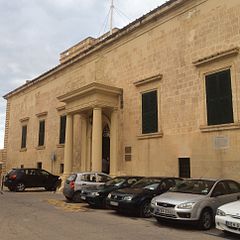Auberge d'Aragon
| Auberge d'Aragon | |
|---|---|
| Berġa ta' Aragona | |

Façade of Auberge d'Aragon
|
|
| Former names | Gibraltar House |
| General information | |
| Status | Intact |
| Type | Auberge |
| Architectural style | Mannerist (with neoclassical portico) |
| Location | Valletta, Malta |
| Coordinates | 35°54′3.7″N 14°30′45.1″E / 35.901028°N 14.512528°E |
| Current tenants | Office of the Deputy Prime Minister Parliamentary Secretary for the EU Presidency 2017 and EU Funds |
| Construction started | 1571 |
| Renovated | c. 1840s (portico added) |
| Owner | Government of Malta |
| Technical details | |
| Material | Limestone |
| Floor count | 1 |
| Design and construction | |
| Architect | Girolamo Cassar |
The Auberge d'Aragon (Maltese: Berġa ta' Aragona) is an auberge in Valletta, Malta. It was built in 1571 to house knights of the Order of Saint John from the langue of Aragon, Navarre and Catalonia. It is the only surviving auberge in Valletta which retains its original Mannerist design by the architect Girolamo Cassar.
In the early 19th century, the building was requisitioned by the British military, and in 1842 it was leased to Bishop George Tomlinson, being renamed Gibraltar House. At this point, a neoclassical portico was added to the façade, the only alteration to the building since the 16th century. In the 19th and early 20th centuries, the auberge was also used as a printing press and a school.
It housed the Office of the Prime Minister in 1921–33 and 1947–72. Since then, various government ministries have used the building. As of 2016, it houses the Office of the Deputy Prime Minister and the Parliamentary Secretary for the EU Presidency 2017 and EU Funds.
Auberge d'Aragon was designed by the Maltese architect Girolamo Cassar in 1566, making it the oldest auberge in the city of Valletta. The plot of land on which it was built was purchased on 20 September 1569 for the sum of 80 scudi and 8 tari. Construction began in 1571.
In 1674, the Langue of Aragon built the Church of Our Lady of Pilar adjacent to the auberge. The 1693 Sicily earthquake caused serious damage to the façade and the southeast face of the auberge, but the damage was later repaired. The church was also damaged, and it was rebuilt in a new design, being completed in 1718.
...
Wikipedia
